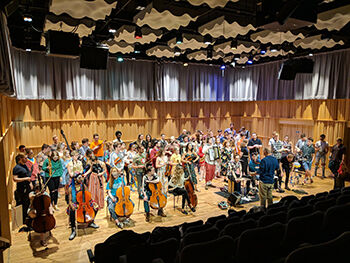University News Last updated 10 July 2019

Speaking at Folk Music Analysis UK, a three-day event showcasing cutting edge technological research methods and findings using ethnomusicology and computational analysis at Birmingham City University, Dr Islah Ali-MacLachlan highlighted advances in the field which now allow for greater understanding of the cultural data embedded in folk music.
The senior lecturer in audio engineering and acoustics said, “In this era of streaming, music discovery, digitisation and algorithms, one of the last bastions of music to be extensively and accurately mapped as well as understood is traditional folk music from across the globe. Sounds that have taken hundreds, if not thousands, of years to evolve, are full of human, cultural, religious, societal and geographical intricacies that we will benefit from understanding.”
26 papers were presented at the event covering a varied range of subjects including a case study on south Iranian bagpipe music; comparisons of human music, speech and bird song; multimedia recordings of traditional Georgian vocal music; visualisation of Hindustani classical music, and the importance of ‘the beat’ for tango dancers.
Tempo, timbre, step changes in melody, pitch, rhythm and other elements of song and music combined with different approaches to capturing sound through field research are all markers that researchers and machine learning – a form of artificial intelligence (AI) – use to define the origin, formation, history and lineage of a particular style of music.
Dr Ali-MacLachlan continued, saying “Computer analysis is often able to make links that are difficult to hear but offer an insight into music from the past or how traditions have changed. Imagine being able to understand how a musician from 200 years ago would play a piece that was written last week, or understanding how Scottish, Irish and African styles eventually transformed into Bluegrass. Computational ethnomusicologists are working on tools that will provide the answers to these questions, and many more.”
Folk Music Analysis is an idea sharing forum delivered in partnership with the Analytical Approaches to World Music journal, and saw attendees from South America, Asia, North America and Europe attend discussions and live music sessions at the Royal Birmingham Conservatoire, Millennium Point, The Woodman and The Spotted Dog, including from the acclaimed 50+ member band Conservatoire Folk Ensemble, led by Joe Broughton.